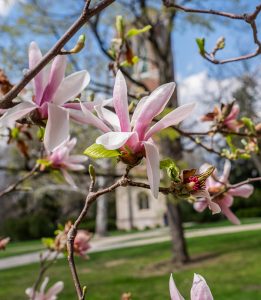Spring Conference on Student Learning and Success, May 6-8, 2019
Each May, we host a conference of MSU educators that showcases innovative teaching ideas and fosters a dynamic community of all who enhance the experiences of students, faculty, and staff.
In 2019, the Spring Teaching and Learning Conference and the Student Success Data Summit have combined into one event!
 The goal of the meeting was to create a shared space for conversation about educational practices that lead to student success. To do so, we encouraged sessions that share impactful and scholarly approaches to teaching, data related to student learning and success, and provide opportunities for professional growth. We hoped to leverage the campus community’s collective skills and knowledge about teaching, learning, assessment, research, and administrative processes to advance student learning and benefit the entire university community.
The goal of the meeting was to create a shared space for conversation about educational practices that lead to student success. To do so, we encouraged sessions that share impactful and scholarly approaches to teaching, data related to student learning and success, and provide opportunities for professional growth. We hoped to leverage the campus community’s collective skills and knowledge about teaching, learning, assessment, research, and administrative processes to advance student learning and benefit the entire university community.
This year’s focus was the Student Learning and Success Strategic Plan, the goals of which are:
- To close opportunity gaps for under served students (first generation, lower income, Black, Latinx, Native American, and/or international students) on campus;
- To increase diversity and inclusion on campus to ensure all students have equitable experiences inside and outside of the classroom;
- To increase campus retention and graduation rates and decrease cost and time to degree.
2019 Spring Conference on Student Learning and Success Schedule
Videos from the Keynote Speakers:
Day 1: Lamar Johnson, Assistant Professor, English, College of Arts and Letters (VIDEO)
Lamar L. Johnson is an Assistant Professor of language and literacy for linguistic and racial diversity at Michigan State University. He explores the complex intersections of anti-black racism, race, language, literacy, and education. As a Black male scholar-activist and teacher, my classroom and research reflect the autobiographical. That is, my racialized, classed, and gendered -selves impact who I am as a scholar-activist—and, they cannot be detached. My commitment to equity, diversity, and inclusion extends through my research, teaching, service, and outreach. From my experiences teaching secondary English to my experiences in academia, justice has always been at the core. I am centrally concerned with equipping students, youth, faculty and staff, and communities to embrace a radical imagination where we (re)imagine the world not as it currently is but what it has the potential to become. To (re)imagine the world, I create and implement equity-based and justice-oriented frameworks, curricula, and pedagogies that build racial consciousness while disrupting deficit ways of knowing and being.
Day 2: Kathleen Fitzpatrick, Director of Digital Humanities and Professor of English, College of Arts and Letters (VIDEO)
Kathleen Fitzpatrick is Director of Digital Humanities and Professor of English at Michigan State University. She is author of Generous Thinking: The University and the Public Good (Johns Hopkins University Press, 2019), as well as Planned Obsolescence: Publishing, Technology, and the Future of the Academy (NYU Press, 2011) and The Anxiety of Obsolescence: The American Novel in the Age of Television (Vanderbilt University Press, 2006). She is project director of Humanities Commons, an open-access, open-source network serving more than 17,000 scholars and practitioners in the humanities.
Day 3: Jenna L. Rickus, Associate Vice Provost for Teaching and Learning, Purdue University (VIDEO)
Jenna Rickus is the associate vice provost for teaching and learning at Purdue University with a faculty appointment as professor of agricultural & biological engineering and biomedical engineering. She previously served as the associate department head of Agricultural and Biological Engineering. Dr. Rickus is an interdisciplinary researcher and educator who has made an impact in establishing biological engineering as a discipline as well as in the application of biofunctional materials and biosensors to understand cell function and treat human disease. She is a Purdue Faculty Scholar and a member of the Purdue Innovator Hall of Fame. She received her bachelor’s degrees in agricultural engineering and in biochemistry from Purdue University and was the first graduate of the Ph.D. program in neuroengineering at UCLA.
Poster presentations
If you have any questions please email AAN@msu.edu.
Collaborators
We collaborate with the following MSU units to make this conference as broad-ranging as possible:
- The Graduate School
- The Hub for Innovation in Learning and Technology
- The Office for Inclusion and Intercultural Initiatives
- IT Services Teaching and Learning
- MSU Libraries
- The Neighborhoods Student Success Collaborative
- The Office of the Associate Provost for Undergraduate Education
- Residential and Hospitality Services
- College Student Success Group
- Institutional Research

